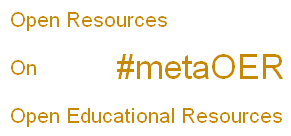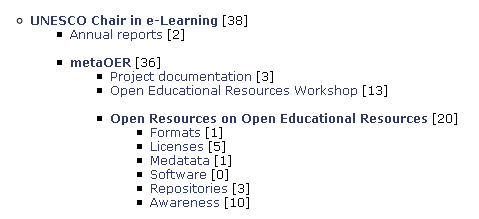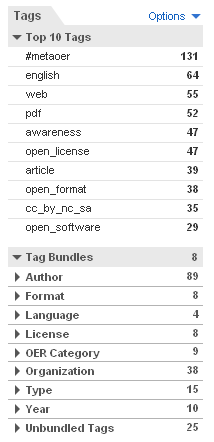MetaOER
Contents
Goal of the project
"A simple way to centralize Open Resources about OER"
Summary
The overall goal of the #metaOER project is to facilitate the progress and promote the Open Educational Movement around the world. Yet, in order to accomplish such a loftygoal, the #metaOER Project Group has devised a three-part project in order to tackle such an obstacle. The project will focus on constructing an Open Repository in which professors and researchers alike could potentially deposit educational materials for "sharing, remixing, and reusing (Creative Commons)." The #metaOER Project of the UOC UNESCO Chair in e-Learning aspires to become one of the predominant open repositories in the world, becoming an essential weight-bearing pillar in the open education movement.
Second, the Project is planning to innovate the way people deposit and withdraw educational resources from the World Wide Web. Using the facility of today's Web 2.0 tools, the Project plans to create a script that would automatically update the institution's repository with any educational resources tagged on one of the Web 2.0 sites. For example, Delicious, which is a social bookmarking website, could be used to tag and bookmark a document. This document, along with all of its tags, would then be instantly retrieved and posted on the institution's repository for the world to "share, remix, and reuse".Third, the institution plans on creating an all-encompassing guide. This guide would potentially walk anyone who is interested in open educational resources (students, secondary teachers, college professors, researchers) through the necessary steps to post educational materials on the institution's open repository. The guide will be as simple and concise as possible, and it is the project's aim, that within a few minutes, someone who did not know about the Open Educational Resources before will have been fully introduced and integrated into the movement.
A community of practice will be established around the #metaOER Blog during the Open Education Week 2012.
Scenarios
Scenario #1
Suppose a student is having trouble with his homework and decides that he needs help. Being the 21st century, the student resorts to the World Wide Web before he considers referencing his textbook, friends, or even his teachers. The student opens a search engine, such as Google, Yahoo, or Bing, and searches for help. The student uses keywords that he determines are most likely to give him the most relevant results. Most often than not, the student will have to spend some time searching for the information he is looking for if it is even there.
Scenario #2
Suppose a teacher would like to gather educational material in order to prepare a lecture on a topic that was requested by her students. Much like the student from scenario #1, the teacher will most likely resort to the World Wide Web at one moment or another when looking for educational material. Using the various search engines mentioned in scenario #1, the teacher would query the search engine with certain relevant keywords. Yet, there are certain variables not taken into account when looking for educational material online. Is the material found appropriate for the age group of the teachers’ students? Is the material up-to-date? Is the material reliable? All of these questions and more are uncertain when an educator is looking for educational materials for her class. These variables could result in the teacher spending countless time on the web searching for unusable material.
Scenario #3
A researcher X is given a long and arduous task in which researcher Y, who is halfway around the globe, has already completed. The results from the task are costly and researcher Y hosts the results only on his institutional private database. Before researcher X begins his experiments and tasks he does some research on the World Wide Web, to gain some insight on the matter. Although researcher X has gained some hints about the task at hand, he does not find the results discovered by researcher Y. Researcher X spends vast amounts of money and time on the same experiments and tasks as researcher Y, just to get the same results.
Conclusion
All three scenarios share something in common. They can all have a negative closing in which each of the three protagonists (student, educator, or researcher) spends valuable time or money. With the World Wide Web and search engines becoming the number one resource of information for our century; it is imperative that the information we are looking for is available, creditable, and accessible. If a resource is missing any of the three qualities mentioned above, then the resource could have equally never existed.
It is the goal not only of the #metaOER Project, but of the open education movement to make educational resources freely available, accessible, and creditable. If all of the education material were to be centralized in one or a few repositories, then education could have a commonly known address in which everyone would be invited to learn. Also, the centralized educational material would be supervised in order to sustain credibility. Yet, who would be willing to take the burden of organizing and sorting all those resources? How does one go by making the material accessible to everyone? And who is to supervise all the material? All of the answers to these questions are being answered by the students, teachers, and researchers that are tired of wasting their time and money. Proponents of OER are proposing solutions every day, but much like OER themselves, the answers to these problems are decentralized. The #metaOER Project has then set forth to centralize these distant resources using Web 2.0 Tools. The preliminary steps of the projects have begun and the project has concentrated on constructing, ""A simple way to centralize documents about OER." In the spirit of the open education movement if the ideas and resources about OER were to be centralized, so that everyone who is interested in the topic or the cause could contribute, we could be one step closer in making OER truly "Open".
Project Outline
1) Open Repository hosted by the UOC:
The Open University of Catalonia has been gracious enough as to provide their institutional repository as the host of the UOC UNESCO Chair's Open Repository. Under the institutional repository, the project plans to create a community named UNESCO Chair in e-Learning. Under the sub-community of UNESCO Chair in e-Learning one will find a sub-community listed as #metaOER. It represents a subcommunity that contains all information about the project (project documentation, guidelines, etc.) Under the sub-community #metaOER there will be another sub-community listed as Open Resources on Open Educational Resources where the project will store open resources about open educational resources (i.e. resources about resources). The stored resources will be divided in five different collections. The collections and sub-communities are intentionally very broad as the Project wants to leave flexibility in the open repository for future expansion. This structure of communities, sub-communities, and collections would be similar to the following:
2) Integrating the Institutions Open Repository with Web 2.0 tool Delicious:
Using Delicious to tag and organize resources found about open educational resources (i.e. resources about resources) One of the first tasks the Project issued was to collect as many documents about OER as possible, in order to have a large resource pool to reference from. Documents on the topic of OER were then added to the UOC UNESCO Chair in e-Learning Delicious account, and were tagged using the following tag bundles:
- Author
- Category
- Format
- License
- Type of document
- Organization
3) Walkthrough Guide:
This Guide is intentionally concise to be line with the overall goal of this project, "A simple way to centralize documents about OER". 7 easy steps to publish & tag a resource on Delicious
1. Obtain a delicious account 2. Create a new bookmark 3. Obtain and insert the URL of the resource 4. Insert "Title" (mandatory) and any "Notes" of the resource 5. Tag the resource with the '#metaoer' tag 6. Tag the resource with the rest of the tags 7. Click Save and you are done
We encourage tagging documents about OERs with #metaoer, as this tag signifies the participation of this project more than giving information about the resource itself.
MetaOER Document categories
- Awareness
Documents related to the philosophy behind the OER movement, institutional declarations, policies and so.
- Formats
Documents related to the best file formats and standards used to support OER documents.
- Licenses
Documents for understanding which license is more appropriate and the restrictions imposed by each one.
- Metadata
Documents about standards and specifications for describing learning objects using metadata, vocabularies, and taxonomies.
- Repository
Documents about how to build and maintain an open repository, as well as documents about best practices and collections of OERs.
- Software
Documents about software tools related to the other categories (format conversion, repositories, etc.)
Types of Documents
▪ Wiki ▪ Article ▪ Video ▪ Tutorial ▪ Graphic ▪ Book ▪ Editorial ▪ Web
Formats of Documents
▪ PDF ▪ Web ▪ Software ▪ Excel ▪ Image (JPG, PNG, TIFF...) ▪ Power Point
Licenses
Basic licenses provided by Creative Commons:
- CC-by (BY) Attribution alone (Creative Commons)
- CC-by-sa (BY-SA) Attribution + ShareAlike (Creative Commons)
- CC-by-nd (BY-ND) Attribution + NoDerivatives (Creative Commons)
- CC-by-nc (BY-NC) Attribution + Noncommercial (Creative Commons)
- CC-by-nc-sa (BY-NC-SA) Attribution + NonCommercial + ShareAlike (Creative Commons)
- CC-by-nc-nd (BY-NC-ND) Attribution + NonCommercial + NoDerivatives (Creative Commons)
Basic licenses provided by GNU-Project:
- GNU General Public License (GPL) (GNU)
- GNU Lesser General Public License (LGPL) (GNU)
- GNU Affero General Public License (AGPL) (GNU)
- GNU Free Documentation License (FDL) (GNU)
Sources
- O2 - Open Access Repository of the Universitat Oberta de Catalunya (UOC)
- UOC UNESCO Chair in e-Learning Institutional Webpage
- UOC UNESCO Chair in e-Learning Delicious Account
- MetaOER - Open Resources on Open Educational Resources sub-community at O2 - Open Access Repository of the Universitat Oberta de Catalunya (UOC)
- MetaOER Website
- MetaOER Blog - Community of practice
- MetaOER Project Overview (2011) - Download File (PDF, 265 KB)


